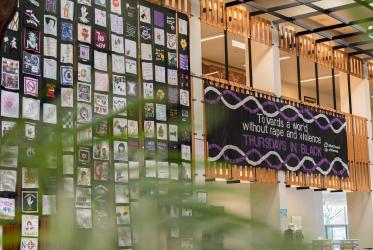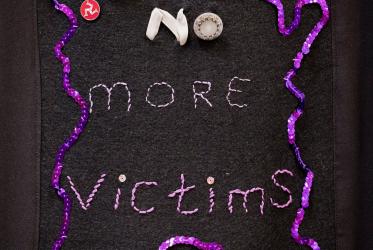The World Council of Churches (WCC) has released a video that highlights reflections from across the globe on how love heals, not hurts. The short film is part of a special WCC campaign addressing abuse and violence in “loving” relationships.
On Valentine’s Day, 14 February, tens of thousands of people across the world will wear black in commemoration of the Thursdays in Black campaign against rape and violence.
Valentine’s Day is a time to celebrate love yet, for too many people, “love” comes with abuse and violence. WCC invited reflections on a Biblical passage often used to describe love:
“Love is patient; love is kind; love is not envious or boastful or arrogant or rude. It does not insist on its own way; it is not irritable or resentful; it does not rejoice in wrong doing, but rejoices in the truth. It bears all things, believes all things, hopes all things, endures all things.”
1 Corinthians 13:4-7
Now these reflections from all over the world have been compiled in a video and online to help spark conversation, awareness and empathy as we seek a world without rape and violence.
What is love?
“This is possibly the text most often used in wedding celebrations and it is familiar to all of us,” reflected Lyn van Rooyen from South Africa. “I am sure that marriage preparation classes and counsellors would be happy to promote these thoughts!”
But, van Rooyen asked, could it be that this text is actually harmful? “It is to the last part of the well-known verse that I would like to turn our focus: It bears all things, believes all things, hopes all things, endures all things,” she said. “Too many times I have heard women (and their pastors!) quote this text in ways that are harmful and life-limiting: ‘Yes, he abuses me, but you know, the Bible says I must bear all things.’ ”
As people of faith - individuals, churches, faith communities and faith-based organisations - we cannot just say that people in abusive relationships should “bear all things, hope all things, endure all things,” noted van Rooyen.
“We have a different responsibility: A responsibility to guide and support people who are victims of abuse to become survivors and victors, to live their lives abundantly - physically, emotionally and spiritually! A responsibility to speak out against abuse,” she said.
Love cannot exist with violence
Susan Jacob, from the Malankara Orthodox Syrian Church in India, reflected on how love cannot exist with violence. “Love is compassion, concern, care and consideration. Love is gentle. Love does not hurt either physically or mentally,” she said. “Violence that is born out of hatred, out of an evil and jealous heart, out of sadistic, brutal and perverted thought, does not exist where love is. Such violence hurts and scars one’s soul and is to be condemned.”
Rev. Robina Marie Winbush from the Presbyterian Church (USA) noted that the context for the passage in 1 Corinthians was for a community in conflict rather than interpersonal relationships. In this context, she states, “The description of love—the very essence of God in our midst—as read in this passage is an invitation to both reflect and recognize the God presence in our relationships.”
She concludes: “This is a love that we celebrate that is more enduring than cards and candy and flowers and perishable trinkets. This is a love that heals the hurts of our lives and this world.”
More information:
www.oikoumene.org/thursdays-in-black#valentine
Additional reflections: Pilgrimage of Justice and Peace blog






